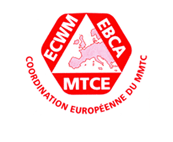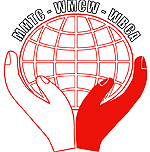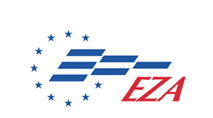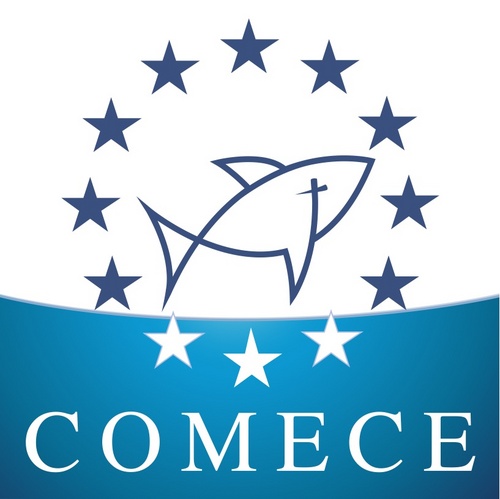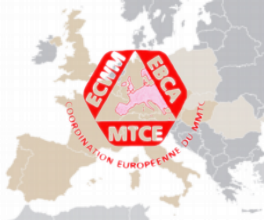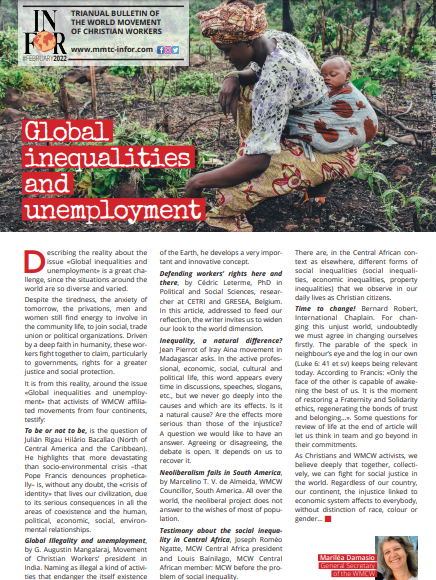-
Details
-
Also available:



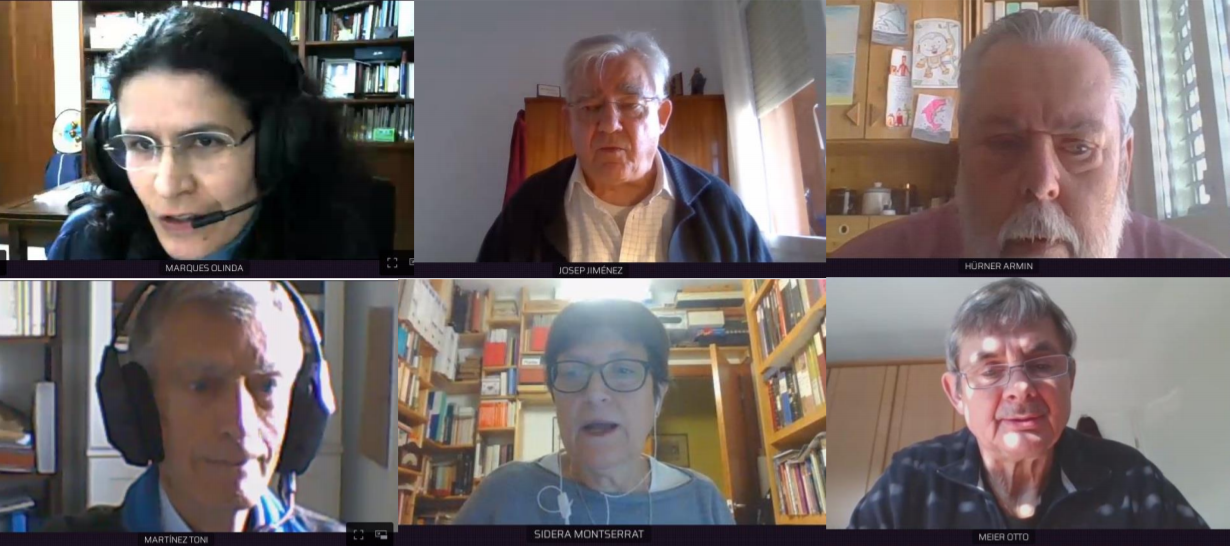
The meeting of the ECWM coordination group took place on 13 February 2021. The circumstances of the Covid-19 pandemic forced the group to meet online, a new challenge that brings it to work and plan the future of the European movement in a different way. The meeting was attended by the President, Olinda M., (Portugal), Chaplain Josep J. (Spain), Treasurer Armin H. (Switzerland), Coordinator Toni M. (Spain), as well as representatives of the movements from Spain (HOAC and ACO), Italy, France, Germany, Switzerland (KAB and CTC), Austria and England, and representatives of the WMCW world movement: Fátima C. (Portugal) Co-Chair, Mariléa D. (Brazil) Secretary General, Bernard R. (France) Chaplain and Philippe Ch. (France) Treasurer.
The usual agenda items were discussed, as well as the preparation of various amendments to the statutes to be discussed at the General Assembly scheduled for September 2021, which will be held, if possible physically in Lisbon, or on-line.
Read more ...
-
Details
-
Also available:



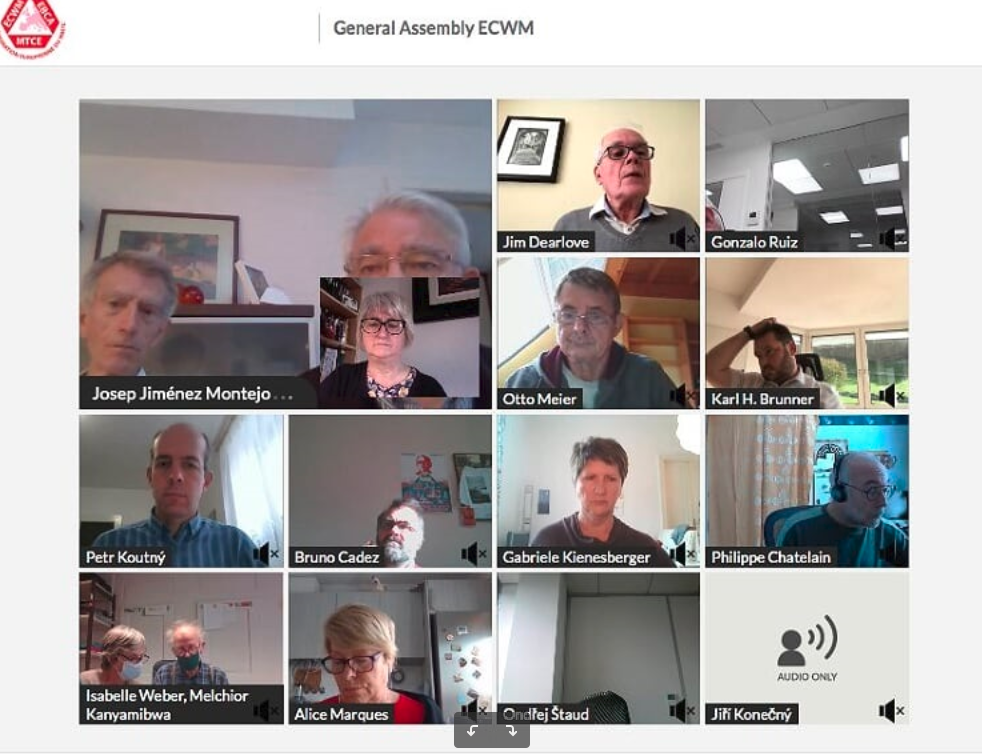
On 16 October 2020 the ECWM held its annual general assembly. This time it was held telematically due to the COVID-19 pandemic. Representatives from 11 movements from 9 European countries took part. Three representatives of the WMCW (World Movement of Christian Workers) also took part
A highlight has been the election of the new president. Olinda Marques, a member of the LOC-MTC movement in Portugal, was unanimously elected to replace Petr Koutný, from the KAP movement in the Czech Republic, who had held the presidency for two years.
In addition, the activities carried out by the ECWM and its member movements in the period since the previous General Assembly, held in Ostend, Belgium in October 2019, have been reported.
We are pleased to have been able to hold this fraternal meeting, albeit through screens, and we have set ourselves up for the next assembly, scheduled for September 2021 in Lisbon.
-
Details
-
Also available:



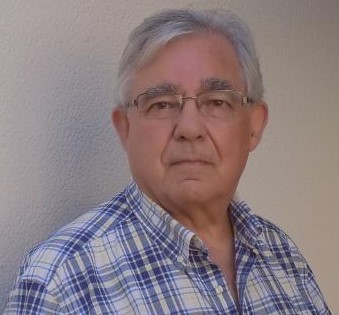
Prayer for our hurting world
O Lord,
to you we come in these dark and hard times.
To you we come to explain you the pain and death
that causes the pandemic that decimates our peoples.
And we put the words of the psalmist into our mouths:
"Say to the Lord: “My stronghold, my refuge,
my God in whom I trust!”
He will rescue you… from the deadly pestilence…
He will give you refuge under his wings.
You shall not fear the terror of the night…
nor the pestilence that stalks by night,
and the plague that destroys at noonday (Ps 91,2-6).
Read more ...
-
Details
-
Also available:



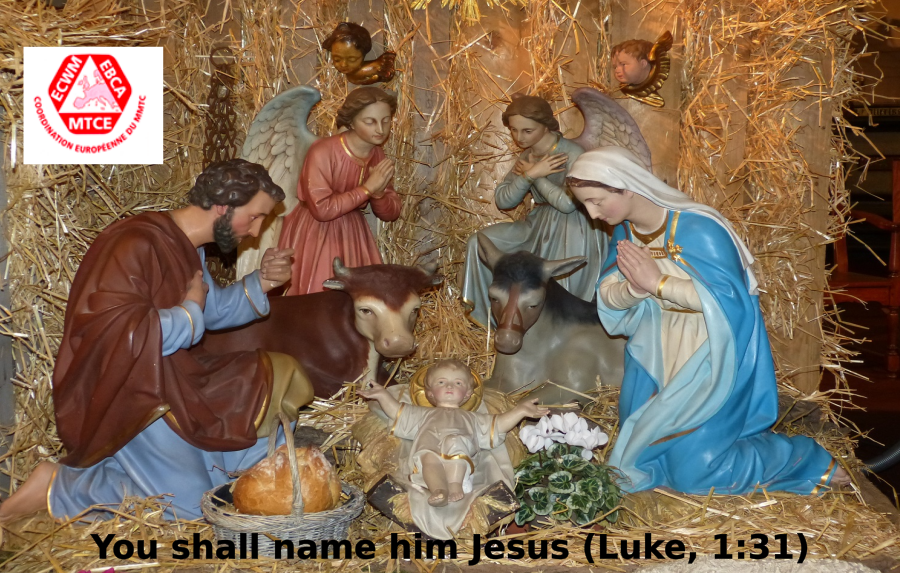
“Comfort, give comfort to my people” (Is 40: 1). With these words of hope and trust from the prophet Isaiah, we start this Christmas message addressed to all members of movements which make up ECWM, in these hard times that our world and our Europe are suffering. COVID-19 pandemic has taken a heavy toll in many of our fellow citizens, both in health and economic aspects, venting its rage over those who suffer the worst living conditions. Moreover, many European citizens have died in our countries because of this pandemic.
“Because there was no room for them in the inn” (Lk 2: 7). Many of the precarious situations that European citizens suffer, were experienced by Jesus, the Son of God, at his birth. A situation of poverty lived in these times by many people: workers fired, jobs destroyed, the sick, psychological damage, deaths and other consequences that deteriorate us as individuals and society.
“Let us go, then, to Bethlehem to see this thing that has taken place, which the Lord has made known to us." (Lk 2: 15). The health and working conditions that our society live call us to get close the manger of Bethlehem and to watch in it to Jesus who is born in the midst of our world wounded by precariousness and pain. This is why we repeat the action of shepherds when we go to those who suffer most this pandemic. Make solidarity, fraternal love and the dedication of our time be the hallmark of our visit to the poor and humble manger that our world is today.
Read more ...
-
Details
-
Also available:



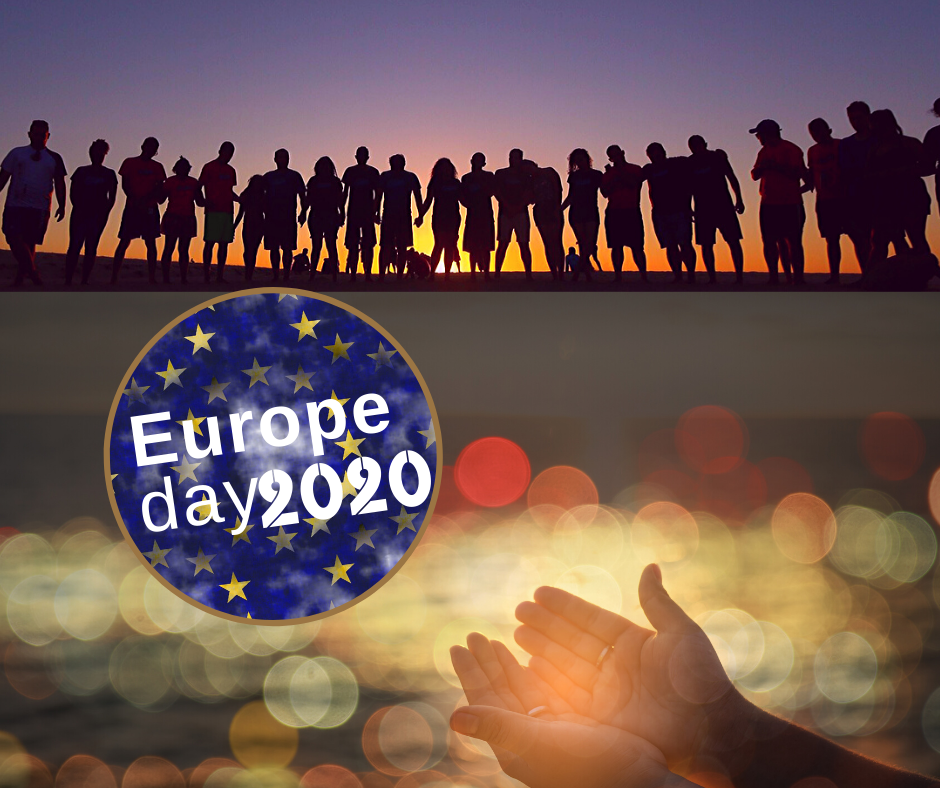
Requiem for a Europe that must die, ode to a hoped Europe
1. In these Covid-19 days we see how the society and the popular and working classes are organizing themselves in solidarity and mutual support networks. We see the rebirth of community action and attention to the most unprotected people. We see how the bold work of health community is recognized every day, the central importance of domestic workers and those who care the sick and dependent people, the heroism of so many daily saints, as pope Francis likes to be called, despite to all difficulties and despite that we have the individualism virus inoculated since forever, and even more so by this predatory and fratricidal capitalism that has brought us to the edge of precipice.
2. For that reason, if the human tissue is being remade from the smallest, with many drops of love, humility and generosity, we aspire to see these dynamics in the authorities which govern us and also in the enterprises where we work. Thus, we are hurt to see how the governments of member States in Europe and in the community, institutions reproduce, in their own interest, some dynamics that have already taken place, as in the financial crisis 2008 and that must be overcome at this so serious moment.
Read more ...
-
Details
-
Also available:



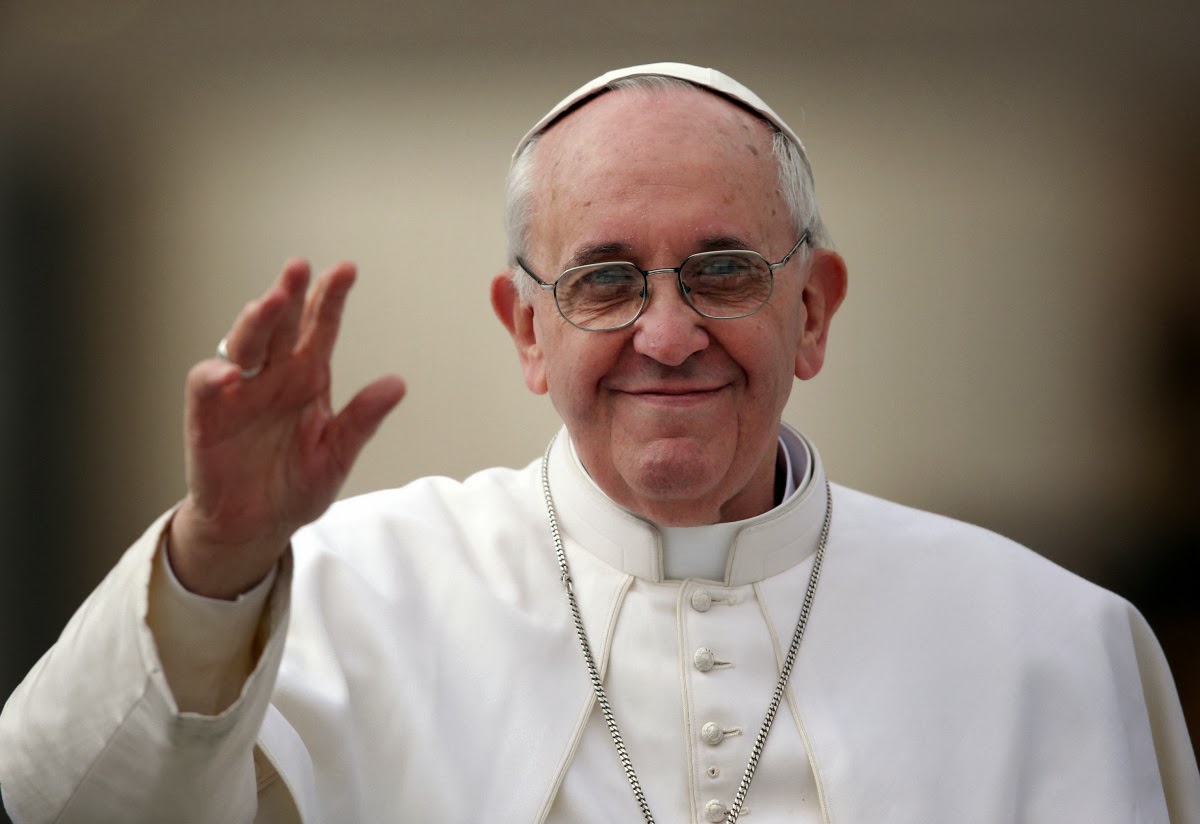
To our brothers and sisters of popular movements and organizations
Dear Friends,
I often recall our previous meetings: two at the Vatican and one in Santa Cruz de la Sierra, and I must tell you that this “souvenir” warms my heart. It brings me closer to you, and helps me re-live so many dialogues we had during those times. I think of all the beautiful projects that emerged from those conversations and took shape and have become reality. Now, in the midst of this pandemic, I think of you in a special way and wish to express my closeness to you. In these days of great anxiety and hardship, many have used war-like metaphors to refer to the pandemic we are experiencing. If the struggle against COVID-19 is a war, then you are truly an invisible army, fighting in the most dangerous trenches; an army whose only weapons are solidarity, hope, and community spirit, all revitalizing at a time when no one can save themselves alone. As I told you in our meetings, to me you are social poets because, from the forgotten peripheries where you live, you create admirable solutions for the most pressing problems afflicting the marginalized.
I know that you nearly never receive the recognition that you deserve, because you are truly invisible to the system. Market solutions do not reach the peripheries, and State protection is hardly visible there. Nor do you have the resources to substitute for its functioning. You are looked upon with suspicion when through community organization you try to move beyond philanthropy or when, instead of resigning and hoping to catch some crumbs that fall from the table of economic power, you claim your rights. You often feel rage and powerlessness at the sight of persistent inequalities and when any excuse at all is sufficient for maintaining those privileges. Nevertheless, you do not resign yourselves to complaining: you roll up your sleeves and keep working for your families, your communities, and the common good. Your resilience helps me, challenges me, and teaches me a great deal.
Read more ...
-
Details
-
Also available:




LET US REMAIN UNITED
This is the time to show our commitment to European values
The COVID-19 pandemic and its dire consequences have hit Europe and the entire world with full strength. Putting to the test every person, family and community, the present crisis has exposed the vulnerabilities and apparent certainties of our politics, economics and societies.
Nevertheless, these trying times are also allowing us to re-discover our common humanity as brothers and sisters. We think of the many people who are sowing hope every day by exercising charity and solidarity. We would like to pray with deep gratitude for all those who serve their fellow human beings with empathy and warmth by supporting them selflessly: medical doctors, nursing staff, providers of basic services, law and order forces – and persons involved in pastoral care. We wish to pray for all the people who are suffering during this crisis - in particular the sick, the elderly, the poor, the excluded and children experiencing family instability. We also remember all those who passed away in our prayers.
Read more ...
-
Details
-
Also available:



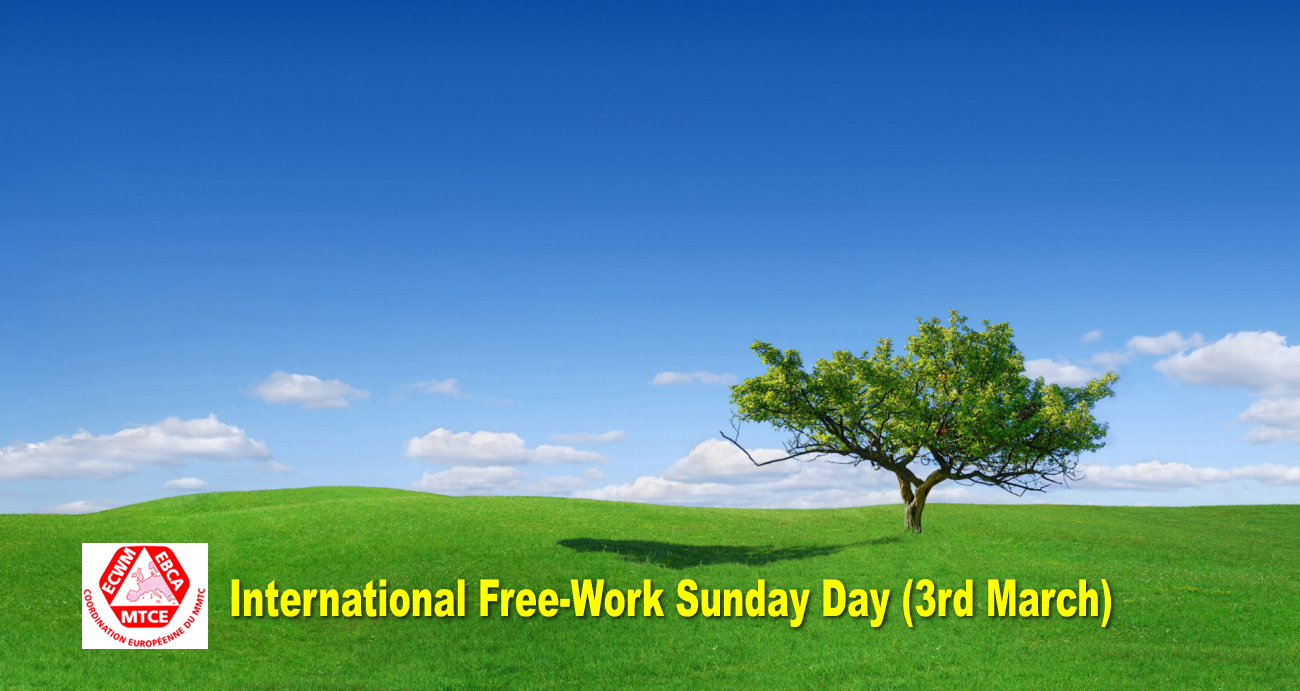
European Christian Workers Movement (ECWM) expresses its full support to all the initiatives taking place on 3rd March that is the International Free-Work Sunday Day. In this year 2020, the ECWM offers the following reflection.
In the world of work we are in a new situation that asks us to open new paths to fraternity, solidarity and sensitivity to suffering and injustice so that it is possible for people to be and to live. The social model in which we live, shaped mainly by the way of human work is conceived and treated, is a great obstacle for social organization and social relations and institutions to favour what they should always serve: that people can realize their being and can live according to their dignity, that we can realize our humanity in image and likeness of God. This is what is radically at stake today and for the future: that people can realize their being and live according to their dignity, and it is very important that we really take charge of this situation in which the social model that has been configured places us:
Read more ...
-
Details
-
Also available:



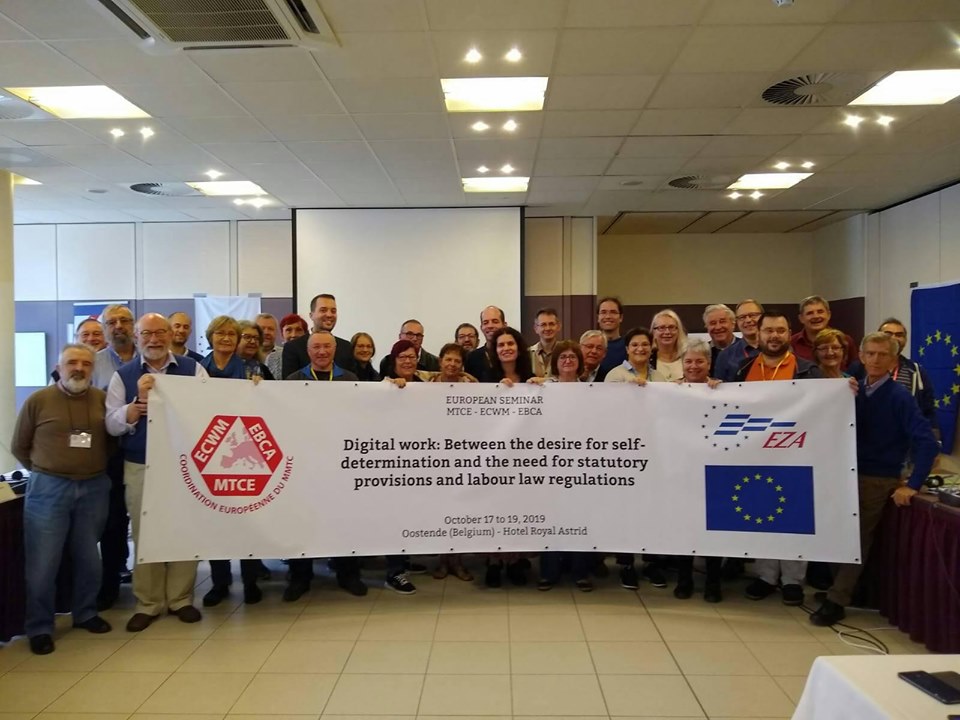
Final statement of the Seminar "Digital work: between the desire for self-determination and the need for statutory provisions and labour law regulations ", held from 17th to 19th October, 2019 in Ostend (Belgium)
A dignified life for EVERYONE in the digital age!
The European Christian Workers Movement (EBCA/ECWM/MTCE) held a seminar entitled "Digital work: between the desire for self-determination and the need for statutory provisions and labour law regulations” from 17-19 October 2019 in Ostend, Belgium. 37 representatives of member organisations from more than 11 European countries participated in the seminar, and all contributed their experience and perspectives.
Conclusions of dialogues
Digitalisation is in full swing, advancing at an accelerated pace and changing our lives in both the private and working environments. It is a phenomenon that affects our whole society and, obviously, has a great attraction, which feeds its development and importance. However, this phenomenon - like many others - can be described as ambivalent and we understand that it is our task to contribute to the configuration of this process by understanding its principles, reflecting its effects on the basis of our horizon of values and considering how and what we can contribute to its configuration as actors. It is also important that we examine the use of digital media with self-criticism.
It is striking that there is a gap in society with regard to digitalisation. On the other hand, there are also a large number of people who, until now, have had little or no access to the new media and who, because of the great importance of digitalisation in the public and work spheres, run the risk of losing contact with society. This problem is worsened by the fact that digital development is very fast and is progressing in all directions at such speed that until now political leaders have regulated barely the process, which aggravates especially the situation of those who are discarded in this process.
In this context, a social message about the future design of a digital world of work is needed, and which we want to start with our calls to the church and society. They arise, among other things, in the following topics:
- Lifelong learning
- Ensuring employment in the transformation process
- Working time and private time with blurred limits
- Ecological issue - e.g. exploited countries supplying raw materials and energy in a global context
- Substitution of economic growth as the main development criterion by values such as solidarity, the common good, etc.
- Fiscal justice and distribution of wealth (prevention of tax evasion, tax harmonization, awareness of the positive dimension of taxation, etc.).
- Development of social security systems (basic income...)
- Work-free Sunday
- Valuation of other forms of work (care, services to society...)
In the political sphere, a dignified life of all people is our criterion in the case of digitalisation. In Laudato si, no. 128, Pope Francis says: "The broader objective should always be to allow them (human beings) a dignified life through work." To achieve this goal, we talk inside our movements and externally, we bring our specific vision in dialogue with representatives of the Church (COMECE, Caritas, Justice and Peace, local Episcopal Conferences, IYCW, ICYCW...), civil society (Trade Unions, NGO´s...) and politics at all levels. An exemplary action is Decent Work Day, which is celebrated on 7th October each year.
Ostend, 19th October, 2019
-
Details
-
Also available:


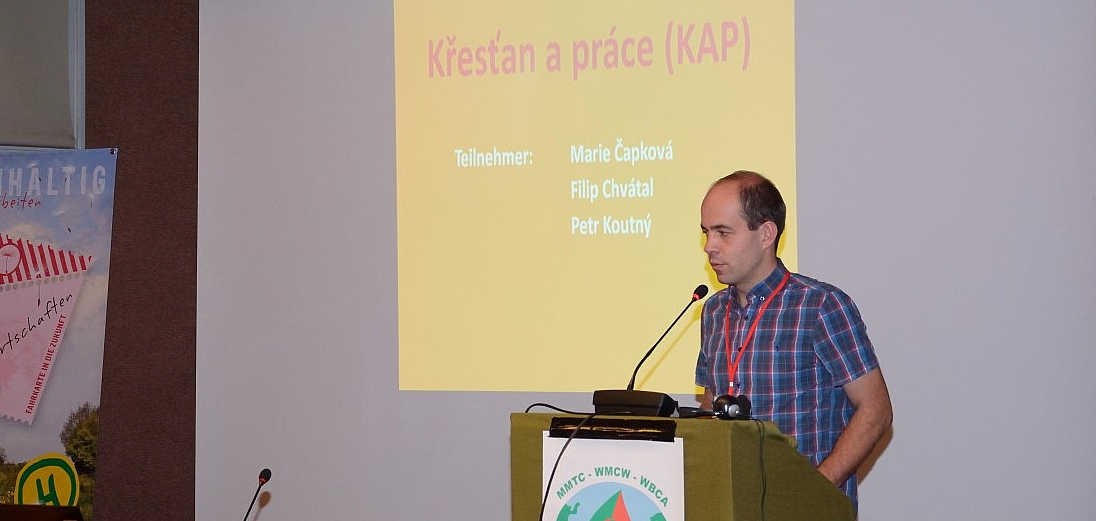
Petr Koutný, ECWM President, May 2019
The last European elections have given us the possibility of focusing on the rich and diverse mosaic which the European Union represents. At the same time, it is an occasion to reflect about what UE has been and is, and to think about the way it should take in the near future.
The EU concept is that of the common home inhabited by people with diverse characters, customs and postures. This fact supposes a huge richness to be respected and taken care of. At the same time we can say that, for the same reasons, our continent is not a paradise and coexistence has not always been idyllic, since there are many realities that -rightly- we consider painful, unpleasant or unfortunate.
But, let’s start with that could appear at the end of this reflection. The EU main objective from the beginning has been a peaceful coexistence of nations. And we must affirm that this purpose has been fulfilled in a wonderful way. We have the privilege that Europe has lived a long period of peace, that it is - from the historical point of view- something exceptional. It has been preferred to solve conflicts sitting around a table, based on dialogue.
In the period that has finished, the EU has had to face to several adversities that have endangered its cohesion. EU has had important tests with phenomena as brexit, the migratory crisis or terrorism that have divided the continent and have reinforced the anti-European trends.
Read more ...
-
Details
-
Also available:



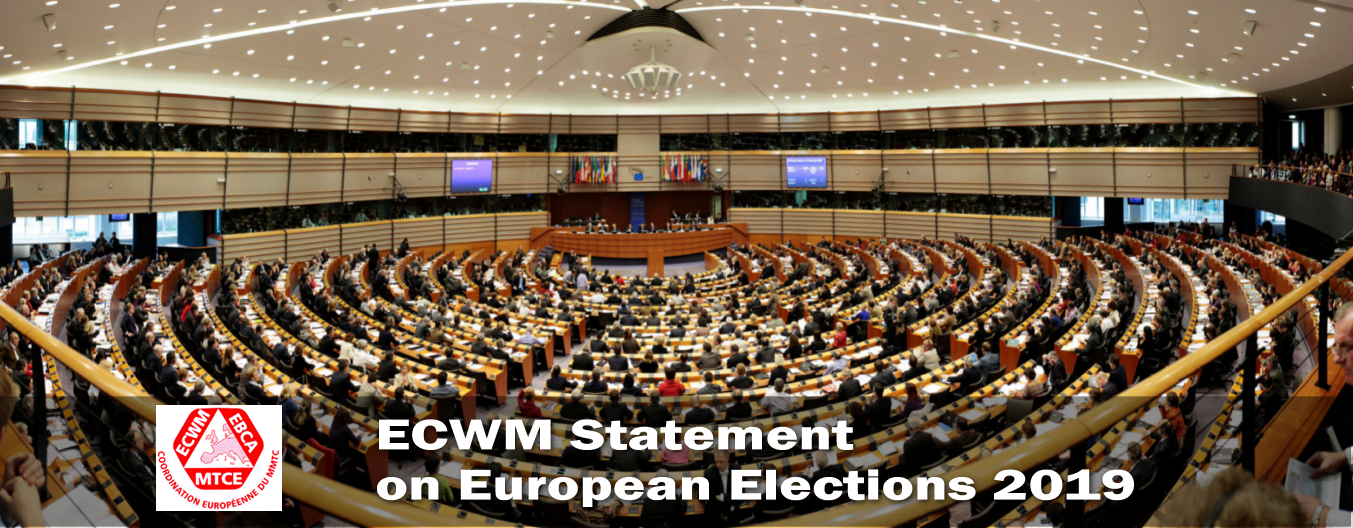
The ECWM (European Christian Workers Movement) is a coordination of movements of christian workers from 10 European countries, fighting for a socially just Europe based on the Gospel and the Social Doctrine of the Church. With a view to the elections to the European Parliament, which will take place from 23 to 26 May 2019, we present our main demands. In this way, we fulfill our responsibility as citizens of the European Union (EU) by providing our point of view of christian workers.
The criterion of all political action
The foundation of our positions is the dignity of each person and our condition as daughters and sons of God. Politics at all levels must protect this dignity and promote it, which, for christians, is a requirement of the Gospel.
Consequences and suggestions
We consider the following demands, of vital importance for the development of our societies in the European context:
- • The social dimension of the EU must oblige the Member States to do justice to every concrete human being with their concerns and needs, since more than 120 million people in Europe risk falling into poverty and social exclusion . The dignity of each of these people demands an urgent response.
- • As suggested by the Social Commission of the COMECE (European Commission of Episcopal Conferences) in its November 2018 document, "Modeling the future of work", we ask everyone's effort to configure the work according to the criteria of human dignity (fair working conditions, decent income, balanced work schedules), sustainability (assuming our responsibility through ecological action), co-management through social dialogue and the participation of everyone in the work process.
Read more ...
-
Details
-
Also available:



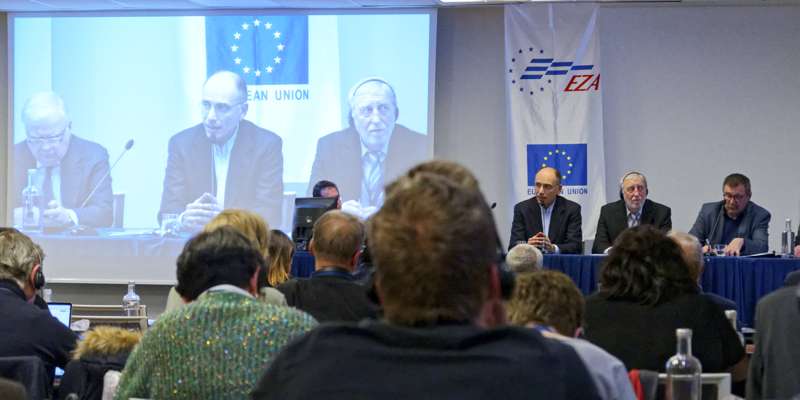
From February 14 to 16, the VII European Social Week was held in Milan. The motto was "Solidarity, Subsidiarity and Common Good - ways to overcome poverty and social inequality in Europe".
It has been attended by almost 100 people, from 21 countries in Europe, representing organizations, parties, unions and Christian movements concerned about justice and social rights. Mr. Antoine Hérouard, president of the Social Commission of COMECE and auxiliary bishop of Lille (France) has also attended. On behalf of the MTCE, we have attended two representatives.
The following presentations, presentations and panels have been developed:
- Ways to get out of the social crisis in Europe
- Changes that await us in the world of work. Work for all?
- The digitalization of the economy and work
- Reality and new challenges in social dialogue
- The new European social order
Read more ...
-
Details

The European Christian Workers Movement (ECWM) has participated in the conference "Building the future of work. A faith-based contribution to the initiative for the centenary of the ILO" that has been convened by the Commission of the Episcopal Conferences of the European Union (COMECE) on November 27, in Brussels.
The world of work faces profound changes. Digitization, the acceleration of globalization, artificial intelligence and the need for an ecological transition alter the conditions and the concept of work and employment. To respond to these challenges, the International Labour Organization (ILO) launched the Initiative on the Future of Labour as part of the centenary of this UN agency scheduled for 2019.
Read more ...
-
Details
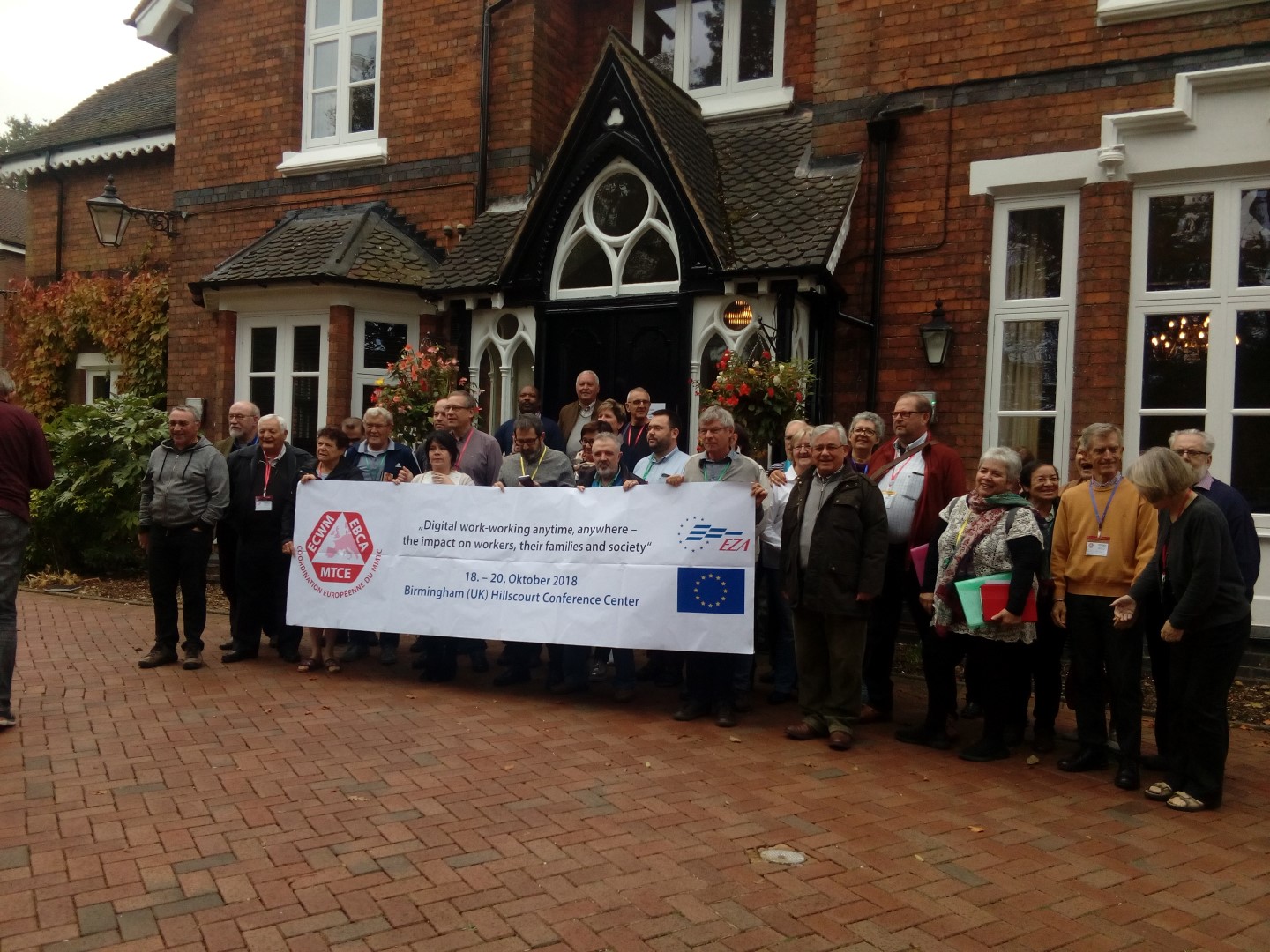
From 18 to 20 October 2018 the annual ECWM Seminar was held in Birmingham (England) with the theme: "Digital work - working anytime, anywhere - impact on workers and their families".
We gathered representatives of 12 Christian workers' movements from 10 European countries to discuss the impact of digital technologies on people, families and social life.
The seminar took place in different working dynamics: communication of experiences and testimonies, expert presentations, group work, plenary dialogues, etc.
The seminar has been structured in three parts: SEE, JUDGE and ACT. This is the formative pedagogy proper to our movements.
Read more ...

